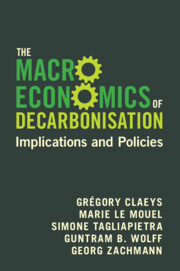Book contents
- The Macroeconomics of Decarbonisation
- Reviews
- The Macroeconomics of Decarbonisation
- Copyright page
- Contents
- Figures
- Tables
- Boxes
- Introduction
- 1 Understanding Deep Decarbonisation over the Long Run
- 2 Understanding Decarbonisation’s Short-Term Disruptions to Economic Activity
- 3 The Distributional Effects of Climate Policy
- 4 Public Finances and Decarbonisation
- 5 Greening Innovation, Industrial and Competition Policies
- 6 Mobilising the Financial System for Decarbonisation
- 7 Decarbonisation and Labour Markets
- 8 Greening Central Banks
- Conclusions
- Index
- References
2 - Understanding Decarbonisation’s Short-Term Disruptions to Economic Activity
Published online by Cambridge University Press: 01 February 2024
- The Macroeconomics of Decarbonisation
- Reviews
- The Macroeconomics of Decarbonisation
- Copyright page
- Contents
- Figures
- Tables
- Boxes
- Introduction
- 1 Understanding Deep Decarbonisation over the Long Run
- 2 Understanding Decarbonisation’s Short-Term Disruptions to Economic Activity
- 3 The Distributional Effects of Climate Policy
- 4 Public Finances and Decarbonisation
- 5 Greening Innovation, Industrial and Competition Policies
- 6 Mobilising the Financial System for Decarbonisation
- 7 Decarbonisation and Labour Markets
- 8 Greening Central Banks
- Conclusions
- Index
- References
Summary
This chapter discusses a different analytical framework used by economists to understand the short-run effects of climate policy: Dynamic Stochastic General Equilibrium models. It presents recent empirical findings in this area and describes the main lessons learned from these models.
Keywords
- Type
- Chapter
- Information
- The Macroeconomics of DecarbonisationImplications and Policies, pp. 43 - 70Publisher: Cambridge University PressPrint publication year: 2024

